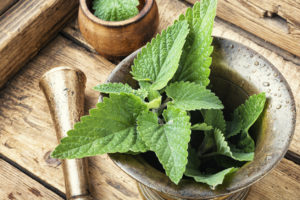Vaginal delivery often comes with postpartum uterine contractions and pain in more than 82% of women. This pain can interfere with bonding between mother and child, interfere with breast feeding, and can obviously affect the comfort and quality of life of the mother. Numerous conventional analgesics are used to mediate the pain, but many plant medicines may be effective, as well as safe for the newly breastfeeding child. Lemon balm (Melissa officinalis) leaves have been used for the sedative and anti-spasmodic properties. Animal studies demonstrate sedative, analgesic, antidepressant and anti-anxiety properties of lemon balm. The current randomized, single-blind controlled trial was conducted to determine the effects of lemon balm on postpartum uterine pain.
A total of 173 women were recruited from a hospital in Iran that had normal vaginal delivery during 2016. Women were excluded who had forceps delivery or vacuum extraction, epidural or spinal anesthesia, severe complications after delivery, diagnosis of chronic disease(s), or taking other herbal or pharmaceutical drugs to treat the pain.
After exclusions were determined, 126 women remained and were randomly assigned to the lemon balm (n=63) or mefenamic acid (n=63) groups. During follow-up, eight women in the lemon balm group declined to participate, used other herbal medicines, or reported stomachache. In the other group, eight participants discontinued due to headaches, stomachache, and use of other herbal medicines., which left a total of 55 women participants in each group.
Each group received either one lemon balm or mefenamic acid capsule after childbirth and again every six hours for the first 24 hours. The lemon balm contained 395 mg of pure lemon balm extract. The other group received capsules containing 250 mg of mefenamic acid.
Postpartum pain intensity between the two groups was not significant during the first and second hours following the first dose. The severity of pain an hour following the third intervention was significantly different between the two groups with lemon balm having better results. In addition, the severity of pain an hour after the fourth intervention was significantly different between the study groups and again better with lemon balm. The mean scores in both groups decreased, but this decrease was higher in the intervention group and the average severity of after-pain was lower in the lemon balm group compared to the mefenamic acid group at all times post-delivery.
Commentary:
In previous studies, the analgesic effect of M. officinalis was related to Rosmarinic acid in the extract of the plant but Citronellal, Ocimene and Caryophyllene are actually the main components of M. officinalis. Another possible mechanism may be related to the spasmolytic and antioxidant properties of lemon balm. The antioxidants prevent the formation of prostaglandin which prevents the oxidation of unsaturated fatty acids, especially arachidonic acid.
Lemon balm does have a tradition of use in postpartum pain and menstrual pain, and this study provides additional evidence.
Reference:
Dastjerdi MN, Darooneh T, Masiri M, Moatar F, Esmaeili S, Ozgoli G. Investigating the effects of Melissa officinalis on after-pains: A randomized single-blind clinical trial. J Caring Sci. September 2019;8(3):129-138.


